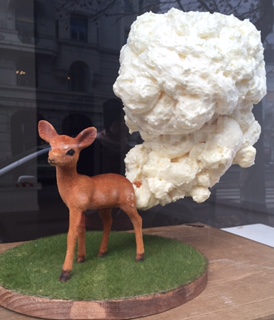School started Sept. 1 in Budapest, but one of the most important lessons my kids will learn this year happened the night before.
My husband and I took my kids, ages 6 and 7, two metro stops down to see the migrants gathered at the Keleti Train Station. We had passed out oranges to the Syrians we found gathered there a few weeks ago as we boarded our train to visit Transylvania. We returned to the station this past Monday afternoon empty-handed to spend time walking among them.
The reality is that I am a migrant, too. I am an American living in Hungary. While I am here by choice and reside legally, the people we saw are trapped. They are not welcome here.
I didn't worry about taking the kids to see the squalid conditions at the majestic 19th-century station, nor did I wonder about our safety in a frantic crowd of refugees traveling with only what they carry and desperate to find a safe haven in Europe. When we passed through a few weeks prior, the refugees were a peaceful crowd. It was a sad campground set up in the modern corridor of the newly renovated metro station hallways.
That night, a few trains were allowed to leave for Germany, but shortly the entire station would be closed to all migrants and international train service suspended as Hungary struggled to create a safe environment for all passengers. Days later, they would start their march on foot toward Austria and Germany before Hungary shut down its border, forcing people to find another route to escape the violence of their homeland.
We were in a hurry then as we had flown in from the States the day before and wanted to make the overnight train to visit Grandma in Transylvania. I bought two shopping bags of oranges along with our snacks for the train, and we left in time to drop the oranges at the migration aid station.
Jet-lagged and cranky, we lugged our bags through the metro and toward Keleti station. When we arrived, however, we didn’t see the volunteers, who would soon be fully organized. Instead, I simply handed an orange to a family with small children. They smiled. I smiled. My kids, who had been reluctant about the idea, saw the exchange and reached for their own oranges to share.
It was my husband’s idea to leave the security of our neighborhood and return to the station the night before school started. It seemed impossible to go about my calm, ordered, privileged routine while hearing the stories of their suffering at the station.
My kids didn’t have much to say while we walked through the crowds, stepping over discarded blankets and filthy toys. Weaving a path around piles of belongings, we made our way to the central crowd. Volunteers passed out food. Another group had brought blankets and art supplies and sat, their laps filled with warm, eager little people happy to play and color even though they didn’t share a common language. A musician had set up and soon a crowd gathered to sing and move their bodies in the release of dance.
This is what I wanted my children to see: the refugee family, clutching only what they can carry, in a foreign land. This is deep down courage. This is what it means to be human. And our response to their plight defines us.
Later, we explained to the kids that these people were trapped at the station because the trains were not running to Germany. We said they had left their homes and all their belongings behind because of war and poverty. They wanted to find a safe home and a chance at a better life.
We were in awe of these people who had risked their lives to escape war. Their futures were uncertain and would be decided on the whim of which train might leave or which rumor they take as truth guiding them along their route.
The next day, my 6-year-old son, entering the first grade, came home from Keleti station and began work with some paper, scissors, tape and colored pencils. I was impressed with what he did. He had drawn a train, cut it out and taped it together using six sheets of paper. It was a long, beautiful train.
He told me he thought we should take it down to Keleti and give it to the kids there. He wanted to give them what they deserve, a chance to grow up in a safe place.
--Janet Kelley grew up in Hutchinson and lives with her family during the school year in Budapest, Hungary. She is a 1993 graduate of Trinity High School. Follow her on Twitter @hutchkelley5
#Hungary #Refugees #Keleti










